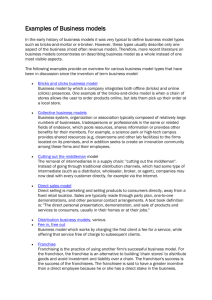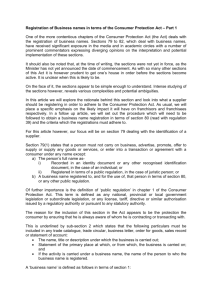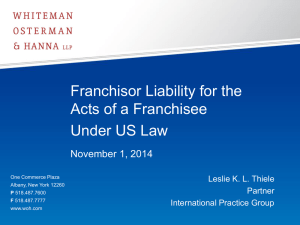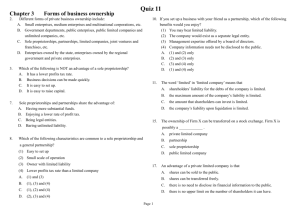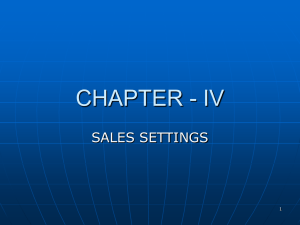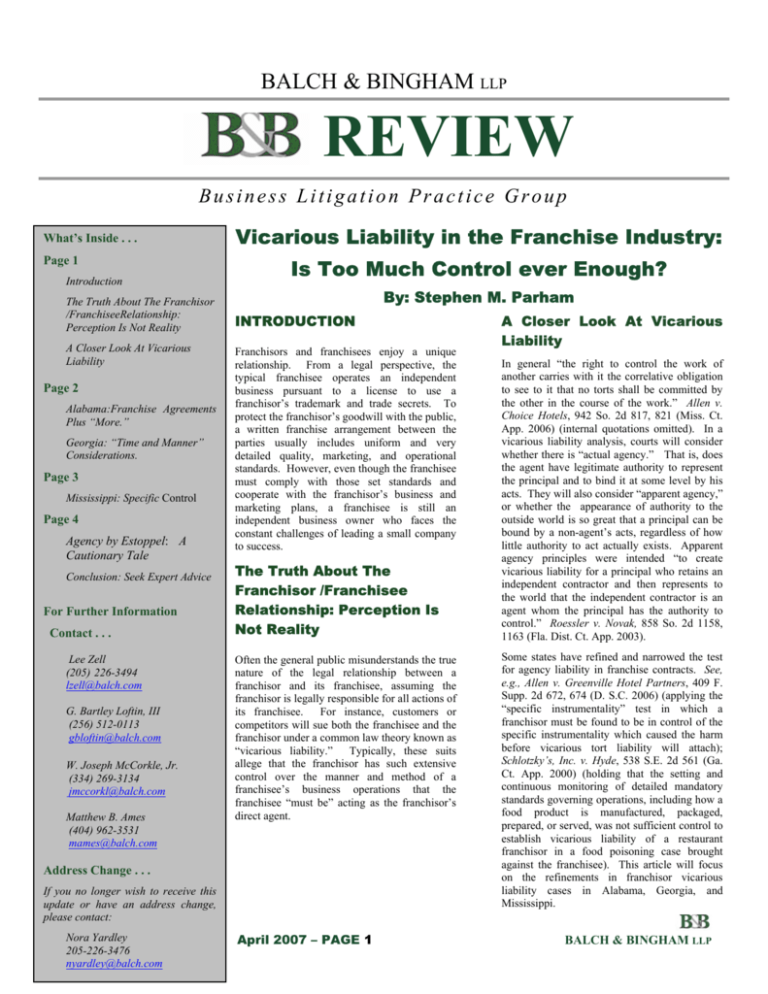
BALCH & BINGHAM LLP
REVIEW
Business Litigation Practice Group
What’s Inside . . .
Page 1
Introduction
The Truth About The Franchisor
/FranchiseeRelationship:
Perception Is Not Reality
A Closer Look At Vicarious
Liability
Page 2
Alabama:Franchise Agreements
Plus “More.”
Georgia: “Time and Manner”
Considerations.
Page 3
Mississippi: Specific Control
Page 4
Agency by Estoppel: A
Cautionary Tale
Conclusion: Seek Expert Advice
For Further Information
Contact . . .
Lee Zell
(205) 226-3494
lzell@balch.com
G. Bartley Loftin, III
(256) 512-0113
gbloftin@balch.com
W. Joseph McCorkle, Jr.
(334) 269-3134
jmccorkl@balch.com
Matthew B. Ames
(404) 962-3531
mames@balch.com
Vicarious Liability in the Franchise Industry:
Is Too Much Control ever Enough?
By: Stephen M. Parham
INTRODUCTION
Franchisors and franchisees enjoy a unique
relationship. From a legal perspective, the
typical franchisee operates an independent
business pursuant to a license to use a
franchisor’s trademark and trade secrets. To
protect the franchisor’s goodwill with the public,
a written franchise arrangement between the
parties usually includes uniform and very
detailed quality, marketing, and operational
standards. However, even though the franchisee
must comply with those set standards and
cooperate with the franchisor’s business and
marketing plans, a franchisee is still an
independent business owner who faces the
constant challenges of leading a small company
to success.
The Truth About The
Franchisor /Franchisee
Relationship: Perception Is
Not Reality
Often the general public misunderstands the true
nature of the legal relationship between a
franchisor and its franchisee, assuming the
franchisor is legally responsible for all actions of
its franchisee. For instance, customers or
competitors will sue both the franchisee and the
franchisor under a common law theory known as
“vicarious liability.” Typically, these suits
allege that the franchisor has such extensive
control over the manner and method of a
franchisee’s business operations that the
franchisee “must be” acting as the franchisor’s
direct agent.
Address Change . . .
If you no longer wish to receive this
update or have an address change,
please contact:
Nora Yardley
205-226-3476
nyardley@balch.com
April 2007 – PAGE 1
A Closer Look At Vicarious
Liability
In general “the right to control the work of
another carries with it the correlative obligation
to see to it that no torts shall be committed by
the other in the course of the work.” Allen v.
Choice Hotels, 942 So. 2d 817, 821 (Miss. Ct.
App. 2006) (internal quotations omitted). In a
vicarious liability analysis, courts will consider
whether there is “actual agency.” That is, does
the agent have legitimate authority to represent
the principal and to bind it at some level by his
acts. They will also consider “apparent agency,”
or whether the appearance of authority to the
outside world is so great that a principal can be
bound by a non-agent’s acts, regardless of how
little authority to act actually exists. Apparent
agency principles were intended “to create
vicarious liability for a principal who retains an
independent contractor and then represents to
the world that the independent contractor is an
agent whom the principal has the authority to
control.” Roessler v. Novak, 858 So. 2d 1158,
1163 (Fla. Dist. Ct. App. 2003).
Some states have refined and narrowed the test
for agency liability in franchise contracts. See,
e.g., Allen v. Greenville Hotel Partners, 409 F.
Supp. 2d 672, 674 (D. S.C. 2006) (applying the
“specific instrumentality” test in which a
franchisor must be found to be in control of the
specific instrumentality which caused the harm
before vicarious tort liability will attach);
Schlotzky’s, Inc. v. Hyde, 538 S.E. 2d 561 (Ga.
Ct. App. 2000) (holding that the setting and
continuous monitoring of detailed mandatory
standards governing operations, including how a
food product is manufactured, packaged,
prepared, or served, was not sufficient control to
establish vicarious liability of a restaurant
franchisor in a food poisoning case brought
against the franchisee). This article will focus
on the refinements in franchisor vicarious
liability cases in Alabama, Georgia, and
Mississippi.
BALCH & BINGHAM LLP
Visit Our Offices . . .
1901 Sixth Avenue North
Suite 2600
Birmingham, Alabama 35203
1710 Sixth Avenue North
Birmingham, Alabama 35203
105 Tallapoosa St. Suite 200
Montgomery, Alabama 36104
655 Gallatin Street
Huntsville, Alabama 35801
30 AllenPlaza, Suite 700
30 Ivan Allen Jr. Blvd., NW
Atlanta, Georgia 30308
1310 Twenty-Fifth Avenue
Gulfport, Mississippi 39501
401 East Capital Street
Suite 200
Jackson, Mississippi 39201
1275 Pennsylvania Avenue, N.W.
Washington, D.C. 20004
Visit our website
www.balch.com
Disclaimer
and
Information . . .
Copyright
This publication is intended to
provide general information and any
opinions expressed are those of the
author only. It is not intended as a
solicitation, and in the event legal
services are sought, no representation
is made that the quality of legal
services to be performed is greater
than the quality of legal services
performed by other lawyers. The
listing of any area of practice does
not indicate any certification of
expertise in the area as listed.
©2007. Balch & Bingham LLP. All
rights reserved.
Alabama: Franchise
Agreements Plus “More”
The analysis of Alabama courts of vicarious
liability in the franchisor/franchisee context
stays fairly close to the traditional common law
theories of agency. See, e.g., Kennedy v.
Western Sizzlin’ Corp., 857 So. 2d 71, 77 (Ala.
2003) (equating a vicarious liability tort claim
against the franchisor to the doctrine of
respondeat superior and stating that “the test for
determining whether an agency relationship
exists is whether the alleged principal reserved a
right of control over the manner of the alleged
agent’s performance”). However, Alabama’s
black letter law also expressly establishes that
“[a] franchise agreement, without more, does
not make the franchisee an agent of the
franchisor.” Carlton v. Alabama Dairy Queen,
Inc., 529 So. 2d 921, 924 (Ala. 1988) (citing
Murphy v. Holiday Inns, Inc., 219 S.E.2d 874,
877 (Va. 1975)).
The seminal Alabama case considering
franchisor vicarious liability claims is Wood v.
Shell Oil Co., 495 So. 2d 1034 (Ala. 1986).
Shell Oil Company (“Shell Oil”) was the owner
of real property that it leased it to an operator
(“Parker Shell”) and with whom Shell Oil
entered into a petroleum dealer agreement.
Plaintiff sued both Shell Oil and Parker Shell for
personal injury when the plaintiff slipped and
fell on the premises. In attempting to establish
the agency relationship between Mr. Parker and
Shell Oil, the plaintiff cited a number of areas
controlled by Shell Oil under the terms of the
two written agreements, including (1) required
hours of operation; (2) required approval of all
physical alterations on the premises; (3) required
diligent merchandising and promotion of Shell
Oil’s products; (4) required type and style of
uniforms; (5) required notification to Shell Oil
of any injuries or damage occurring on the
Parker Shell premises; (6) stipulated Shell Oil’s
right to offer supplemental training to Mr.
Parker’s employees; (7) stipulated Shell Oil’s
right to inspect the dealer's premises, books, and
records to determine compliance with the terms
of the dealer agreement; and (8) stipulated Shell
Oil’s right to terminate the agreement for Mr.
Parker’s failure to carry out the above
provisions.
Nevertheless, the Alabama Supreme Court
refused liability for Shell Oil writing that:
[There is no evidence that Shell Oil]
retained any right or control over the
manner in which Parker Shell
performed in order to meet the
requirements of the lease and dealer
agreement. Although the lease and the
April 2007 – PAGE 2
dealer agreement specify, in some
detail, what Parker Shell must do in
order to conform to the terms of these
contracts, and gives Shell Oil the right
to approve certain aspects of Parker
Shell's operation, they do not
determine how Parker Shell is to
achieve compliance with these terms.
In the years since the Shell Oil decision was
published, Alabama courts considering vicarious
liability claims against franchisors have used the
same tests repeatedly. See, e.g., Rosser v.
AAMCO Transmissions, Inc., 923 So. 2d 294,
300-301 (Ala. 2005) (holding that, as a matter of
law, franchise agreement alone was not
sufficient evidence that franchisor held
franchisee out to public as an agent); Western
Sizzlin’, 857 So. 2d at 77; Dairy Queen, 529 So.
2d at 924; cf. Freeman v. Suddle Enter., Inc.
d/b/a Huddle House # 389, 179 F. Supp. 2d
1351, 1355 (M.D. Ala. 2001) (holding that
sexual harassment imputes vicarious liability
only when a franchisor is in a position to readily
observe egregious behavior amongst a
franchisee’s employees). Thus, in Alabama, a
franchisor’s written contractual requirements
applicable to the franchisee’s business
operations simply are not enough to establish
vicarious liability in most contexts. It is only
when a franchisor closely directs the franchisee
as to how he or she must accomplish those
requirements that problems may arise.
Georgia: “Time and Manner”
Considerations
In Georgia, “vicarious liability is premised on a
principal’s right to control the time and manner
of an agent’s work.” Coldwell Banker Real
Estate Corp. v. DeGraft-Hanson, 596 S.E.2d
408, 410 (Ga. Ct. App. 2004). Without that type
of control, “even franchisors are not liable for
the torts of franchisees.” Id.; see also, e.g.,
Baldino’s Giant Jersey Subs v. Taylor, 454 S.E.
2d 599 (Ga. Ct. App. 1995). In the context of
franchisees and apparent agency, Georgia courts
have held that such agency is present only when
(1) a franchisor holds out its franchisee as its
agent to another; (2) the plaintiff justifiably
relies on the franchisee’s skill or care based on
the franchisor’s representation(s); or (3) the
justifiable reliance leads to injury.
In Coldwell Banker, a family sued a
realty company and an individual real estate
broker, alleging violation of the Fair Housing
Act and intentional infliction of emotional
distress. In holding that the broker was not an
agent of the real estate franchisor, the Court
noted that “it is not sufficient that the [real
estate] agent represent[s] its [own] status as an
BALCH & BINGHAM LLP
agent [of the franchisor]; it must be established that the [franchisor]
held out the [franchisee] as its agent.” In other words, a franchisee
may not place himself or herself into the role of a legal agent based
solely on his or her own representations. At some point, the
franchisor must make a public pronouncement of such agency before
liability may be incurred.
of her husband, and for her personal injuries sustained after robbers
broke into the couple’s hotel room. Noting the lack of Mississippi
case law on the subject of franchisor/franchisee liability, the
Mississippi Court of Appeals reverted to a general principle of
Mississippi case law that establishing one party’s liability for the
actions of another “typically revolve[d] around the idea of control.”
This above analysis works well for tort and contract
violations; but, what about other types of claims that a franchisor
might face, such as intellectual property infringement? As with the
Freeman employment discrimination case in Alabama, these types of
cases in Georgia often revolve around the franchisor’s knowledge
and/or intent, which may be evidenced by the details of a franchisor’s
day-to-day control over the franchisee.
After reviewing the non-exclusive list of factors set forth in
Kisner v. Jackson, 132 So. 90, 91 (Miss. 1930), which are used to
determine whether one party is the master of another, the Choice
Hotels court noted that the franchisor “did not pay the hotel staff’s
wages, . . . did not have the right to hire or terminate ‘subemployees’
or to fix their wages, and . . . had no right to direct the details of the
operation of [the particular hotel in question].”
Consider Mini Maid Service Co. v. Maid Brigade Systems,
Inc., 967 F.2d 1516 (11th Cir. 1992), in which the holder of a
registered trademark sued a competing franchisor after its franchisee
allegedly infringed on the trademark. At trial, the court directed a
verdict for the plaintiff, reasoning that the franchisor had failed to
exercise “reasonable diligence” over its franchisee to prevent such an
infringement.
The appeals court reversed, holding that the
“reasonable diligence” standard should not apply. However the court
noted that, under certain circumstances, “a franchisor might be liable
for contributory trademark infringement, even if the franchisor did
not itself perform any infringing acts” if: (1) the franchisor
intentionally induced its franchisee to infringe on the trademark; or
(2) the franchisor knowingly participated in a scheme of trademark
infringement carried out by its franchisees. The court summarized its
position that “any liability for contributory infringement will
necessarily depend on whether or not the contributing party intended
to participate in the infringement or actually knew about the
infringing activities,” considering “the nature and extent of the
communication between a franchisor and franchisee regarding the
infringing act.” The Mini Maid court also directed lower courts to
consider whether, upon discovering the infringing acts, a franchisor
fails to make a good-faith effort to invoke a clear contractual right to
halt the infringement. As the Mini Maid court explained, “[w]ithout
these standards[,] . . . the combination of a renegade franchisee and
an ambiguous franchise agreement might leave a franchisor in a very
difficult position.”
After Admitting that the relationship of a franchisor and
franchisee is “far different from a contract of employment where the
rules of master/servant are typically applied,” the Choice Hotel court
opted to follow decisions of other states and find a franchisor
vicariously liable for its franchisee’s acts or omissions “only when it
had the right to control the specific instrumentality of or aspect of the
[franchise] business that was alleged to have caused the harm.” Id. at
821-22 (citing Kerl v. Dennis Rasmussen, Inc., 682 N.W.2d 328, 337
(Wis.2004)).
In the Mini Maid context, a franchisor with knowledge of
ongoing improper acts by its franchisee(s) will want to act decisively
in controlling its franchisee’s behavior. At first glance, such an
instruction may appear to be divergent from the “hands off” approach
indicated by cases like Coldwell Banker. A closer examination
shows the court reached the common sense conclusion that a
franchisor with intimate knowledge of a franchisee’s wrongdoing and
who fails to eradicate that behavior, tacitly condones its franchisee’s
method of operations in a fashion very similar to a franchisor who
tells its franchisee exactly how to carry out its obligations. In each
case, the franchisor has gone beyond merely just controlling its
business goodwill.
Mississippi: Specific Control
Mississippi franchisor vicarious liability law is still
developing. In November 2006, for the first time, a Mississippi
appellate court established the standards that should govern the
determination of vicarious liability for a franchisor. In Allen v.
Choice Hotels International, 942 So. 2d 817 (Miss. Ct. App. 2006),
plaintiff sued a hotel franchisee and franchisor for the wrongful death
April 2007 – PAGE 3
The Choice Hotel court then examined the facts of the case, including
the written franchise agreement, which required the franchisee to (1)
use the franchisor’s computer reservation system; (2) display the
franchisor’s logo and marks; (3) post signs indicating the franchisee’s
participation in the franchisor’s business referral and credit card
arrangements; and (4) pledge a high standard of service, courtesy,
and cleanliness, utilizing the franchisor’s “plan and system.” In
return, the franchisor promised to (1) lend the franchisee an
operations and service manual setting out the administration and
operation of the system; (2) provide an orientation program for the
franchisee’s employees; and (3) periodically inspect the hotel to
evaluate the franchisee’s compliance with the franchisor’s rules and
regulations. The franchisee also was obligated to follow the detailed
operational guidelines set forth in a 145-page proprietary document
known as the “Rules and Regulations.”
The Choice Hotels court found that the written franchise agreement
was intended “to provide a system of uniformity for Choice
franchisees” (citing Anderson v. Turton Dev., 483 S.E.2d 597, 601
(Ga. Ct. App. 1997) (finding that Choice’s franchise agreement and
Rules and Regulations did not “direct or control the time, manner,
and method of performance of the daily operations of the franchise
but [were] a means of achieving a certain level of quality and
uniformity within [its] system”)). The court further observed that the
operational standards contained in franchise agreements and
documents, such as the Rules and Regulations manual, were
necessary to protect “the goodwill value of the product and the
trademark associated with the business” and to protect the public’s
expectations of consistent levels of product and/or service quality
from one franchisee to another. 942 So. 2d at 826.
Ultimately, the Mississippi Court of Appeals granted summary
judgment to the franchisor and held that “[w]e find no evidence in the
record which would show that Choice had the right to control the
day-to-day activities of [its franchisee].”
BALCH & BINGHAM LLP
Agency by Estoppel: A Cautionary Tale
Despite the courts’ reluctance to find elements of control in the
typical franchisor/franchisee relationship, it is not impossible for
courts to find such control. For instance, in Crinkley v. Holiday Inns,
Inc., 844 F.2d 156 (4th Cir. 1988) (applying North Carolina law), a
jury found that the franchisor was vicariously liable under a theory of
apparent agency. In Crinkley, the plaintiff husband and wife, while
unloading the last of their baggage from their car parked in front of
their assigned room at the franchise motel, were pushed into their
room by a man with a gun. The gunman beat the husband and
threatened the wife. The plaintiffs brought suit against various
defendants, including the franchisor, and alleged that the franchisor
was negligent by providing inadequate security on the theories of the
franchisee’s actual authority or, alternatively, apparent agency.
In affirming the jury verdict for the plaintiffs, the Fourth
Circuit held that agency may be imposed where a plaintiff shows (1)
that a principal represented or permitted representations that the party
dealing with the plaintiff was its agent; and (2) that the plaintiff has
changed his position in reliance on such representations. In Crinkley,
the franchisor retained a significant degree of control over the
franchise premises. The franchisor originally designed and built the
motel and advertised nationally to promote its national system. It also
published a directory listing properties within the system, without
distinguishing between company-owned and franchise properties.
The only indication the motel was not owned by the franchisor was a
sign in the restaurant which stated the motel was operated by the
franchisee. The franchisor also contended the franchise agreement
disclaimed any agency relationship. The court found that such a
denial is not determinative of liability under apparent agency. Under
these circumstances, the court held the jury could reasonably
conclude that operation of the motel created the appearance it was
owned by the franchisor, as intended by the franchise agreement.
Turning to the reliance prong of the test, the court pointed out that the
plaintiffs’ testimony that they had previously stayed at the
franchisor's motels, that they were familiar with its national
advertising, and that, after their unsuccessful attempt to make
reservations at one of the franchisor’s motels at their actual
destination, they used the franchisor’s directory to find another of the
franchisor’s motels in a city more than 20 miles away rather than
staying at a different motel closer to their destination. The plaintiffs
also testified they did not know the difference between motels owned
by a franchisee and a franchisor and were surprised to learn the
franchisor was not involved in the operation of the franchise
premises. The Choice Hotels court found this evidence was
marginal, but it still was sufficient to get the case to the jury.
Conclusion: Seek Expert Advice
There are no easy answers to the question of how a franchisor can
determine when it is stepping across the invisible line of asserting too
much control over its franchisee and potentially exposing itself up to
a vicarious liability claim. Most courts construe the facts on a caseby-case basis; and, what may amount to “specific control” or “time
and manner” restrictions in one case may not in another. Franchisors
and franchisees both should consider engaging experienced counsel
to review existing franchise agreements, written rules and
regulations, and other franchise policies to point out potential
problems. In these situations, an ounce of prevention really is worth
a pound of cure.
April 2007 – PAGE 4
BALCH & BINGHAM LLP


